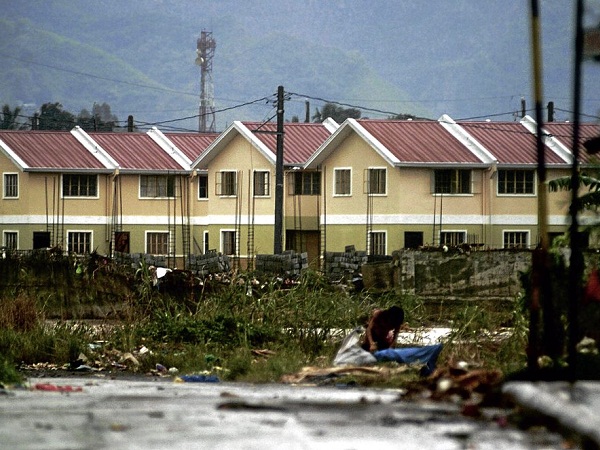Floods bring out wiser buyers, developers

WHILE THE FLOODING and the need for high-rise accommodation seem inevitable, a more balanced and holistic development should be advocated. ARNOLD ALMACEN
As more flood-prone areas are pinpointed with the increasing intensities of weather disturbances, property experts have observed that buyers are becoming wiser and more meticulous in choosing the areas to invest in, as lessons (some painful) from past inundations are beginning to stick. Property analysts see barren days ahead (business-wise, that is) for developers who insist on building in flood-prone areas.
“Caveat emptor (let the buyers beware), the new set of homebuyers that we see now are educated and are Google savvy. They go through the process of initiating market information, geographic research using empirical data and first-hand data,” said Enrique M. Soriano III, Ateneo program director for real estate and senior adviser for Wong+Bernstein Business Advisory.
Soriano added that the only market that is still vulnerable to limited information are overseas Filipinos who have stayed in their host countries for too long to be aware of the situation in their home country.
National Real Estate Association chair Alejandro S. Mañalac explained, “In the first place, developers should have done due diligence and conducted a thorough study of the flooding history of a particular area before even considering to build,” adding that “this is the reason why buyers should look at the finer details when they compare prices.”
“Most of the time, people think they were able to save, until things like these happen and it is already too late to regret the wrong decision. It’s always best to consult professional and experienced real estate practitioners,” Mañalac added.
Stringent process
Julius Guevara, associate director, valuation and advisory services and head of consultancy and research of Colliers International, said that real estate developers typically undergo a stringent due diligence process where they analyze not only the financial risks in developing a parcel of land but the physical hazards as well.
Guevara said: “So, if the location is prone to flooding, then the developer may think twice or at least put in the necessary measures to mitigate the problem. However, developers who have the misfortune of building projects in flood-prone areas will be affected temporarily. But Filipinos tend to have a short-term memory and would likely forget about the risks if they are presented with a good enough deal.”
He cited as an example some subdivisions in the Pasig/Cainta areas which, according to him, were badly affected by Tropical Storm “Ondoy,” but have been doing well recently in terms of sales. “So if there are no other affordable options, people may take the plunge,” Guevara said.
Claro dG Cordero Jr., Jones Lang LaSalle Leechiu’s head of research, consulting and valuation, told Inquirer Property that when Ondoy happened, buyers became more wary of flood-prone areas.
“However, as in the experience months after Ondoy, this challenge was welcomed by developers and they have made several major capital expenditures and investments to mitigate the effects of these natural calamities.”
Reshaping urban dev’t trends
Cordero recalled in the Aug. 24, 2012 JLL research blog “The Rise (Of Flood) In Metro Manila: Lessons and Opportunities,” that “the widespread flooding in Metro Manila in 2009 not only affected the real estate values but was instrumental in reshaping urban development trends consequently.” He added that physical damages and emotional stress from such continual flooding have added to the strong demand for high-rise accommodations.
Cordero said that as of August 2012, the total number of new residential condominium units which will be made available within the next three years has run to more than 142,000. As high-rise accommodation presents a better housing alternative for urban dwellers, the developers are also looking for locations that are less prone to flooding. This has led to an observed increase in real estate values in certain areas, where new communities could be established.
Guevara added: “Given that natural calamities are no longer once-in-a-lifetime events, I would implore both the developers and the local governments to adhere to good urban planning and management practices. An increase in urban density is inevitable, but could be managed more effectively.”
He urged zoning restrictions to be followed to the letter, and if variances are given, the necessary infrastructure should then be put in place.
Guevara explained: “For example, the stormwater systems in the city are only designed to a certain threshold based on a population limit. If the number of housing units in an area is increased through the construction of a condominium, for example, then the stormwater and sewerage systems should also be upgraded to accommodate the increase. Otherwise, our systems will continue to be overwhelmed. Both the developer and the government should bear the cost; in other countries these infrastructure projects are funded through tax increment financing.”
Cordero recommended in JLL’s research blog, “While the flooding and the need for high-rise accommodation seem inevitable, a more balanced and holistic development should be advocated.”
He continued: “The infrastructure (including adequate drainage) and support facilities and services should be sufficient to provide a more sustainable growth of these high-density developments/precincts. Indiscriminate development without concern of the local social and environmental impact could not only result in further degradation of the community and quality of the environment, but lead to imbalanced sprawl and artificially inflated real estate values, which could have far more damaging repercussions in the future.”